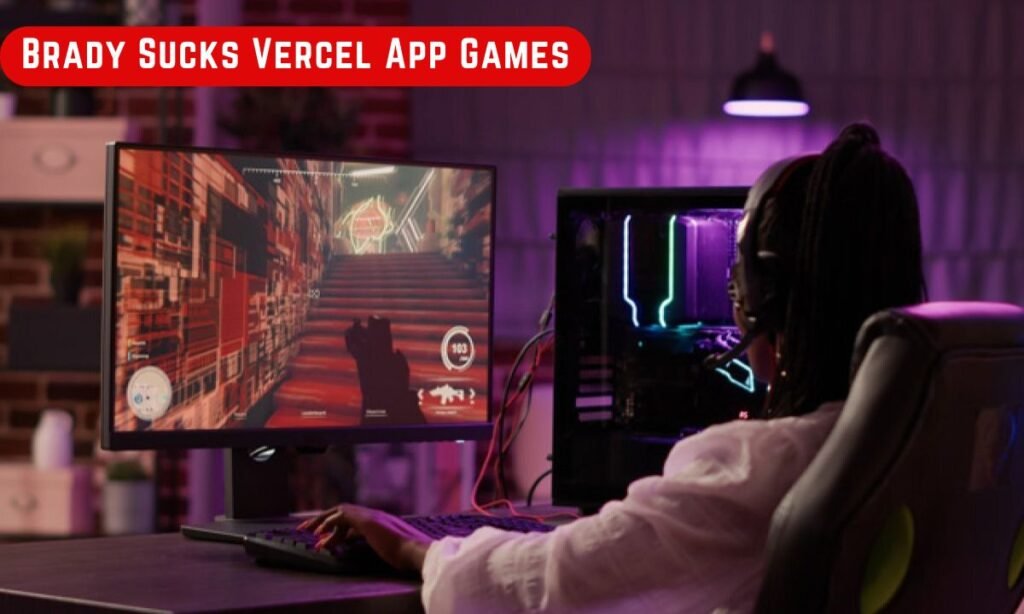In the world of app games, it’s not often you come across a platform with a name as bold as “Brady Sucks Vercel App Games.” Whether you’re intrigued or confused by the name, there’s more to this app than meets the eye. This article dives deep into the Brady Sucks Vercel App Games, uncovering the story behind the platform, its popular games, and the technology powering them. What is Vercel? To understand Brady Sucks, it’s important to know about Vercel. Vercel is a modern platform built to optimize and simplify the process of developing, deploying, and hosting websites and applications. It’s popular among developers for its fast, reliable infrastructure, making it ideal for creating performance-heavy apps like games. Using Vercel’s global edge network, app developers can ensure their games are fast and responsive, no matter where their users are located. Who is Brady Sucks? You might wonder about the unusual name. Who is Brady, and why does he suck? While there isn’t a specific “Brady” behind this app platform, the quirky and provocative name plays a part in drawing attention. It likely serves as a humorous marketing tactic to generate curiosity. It’s not the first time a game or platform has used a controversial or playful name, and sometimes, that’s all it takes to stand out in a crowded market. Overview of Brady Sucks Vercel App Games So, what exactly does Brady Sucks offer in terms of games? This platform hosts a collection of simple yet engaging games, each designed to be quick to load and easy to play. Unlike large-scale gaming platforms with high-definition graphics and complex narratives, Brady Sucks Vercel App Games focuses on casual games that can be played in short bursts—perfect for killing time during a commute or waiting in line. The games typically involve straightforward mechanics like puzzles, strategy, or arcade-style play. Each game is designed to keep the player coming back, with frequent updates and additional features added regularly to maintain engagement. Popular Games on Brady Sucks Vercel Here are some of the most popular games available on the platform: Each game has its unique charm and is optimized for fast loading and smooth performance, thanks to Vercel’s cutting-edge hosting technology. Gameplay Experience The games on Brady Sucks Vercel are designed to be intuitive and user-friendly. Whether you’re playing on a mobile device or a desktop, the interface is sleek and responsive. Players report enjoying the simplicity and fast-paced nature of the games, where there’s little to no downtime between levels. Load times are impressively short, and there are no frustrating lags or freezes, largely due to the platform being powered by Vercel’s hosting infrastructure. The Role of Vercel in Game Optimization Vercel plays a significant role in ensuring that the games on Brady Sucks are optimized for peak performance. With Vercel’s global edge network, the games are served from locations closest to the user, minimizing latency and improving the overall gaming experience. This means whether you’re in New York or Tokyo, you’ll experience smooth gameplay without slowdowns. In the competitive world of app games, speed and reliability are critical factors. If a game crashes or loads slowly, users are quick to move on to the next option. By leveraging Vercel’s performance optimization, Brady Sucks minimizes these risks, delivering a consistent and enjoyable gaming experience. Why the Name ‘Brady Sucks’? Controversial names often attract attention, and “Brady Sucks” is no exception. Whether it’s a tongue-in-cheek reference to someone or just a random pick, the name undoubtedly sparks curiosity. Does it affect the game’s popularity? In some cases, it could actually help—players are more likely to check out a platform with an interesting or humorous name, even if only out of curiosity. It’s a clever marketing tool that sets the app apart from its competitors. Target Audience for Brady Sucks Vercel App Games Brady Sucks Vercel games seem to cater to a broad audience, from casual gamers to those looking for a quick distraction. The platform’s easy-to-play games are ideal for younger players or adults seeking a break from more complex gaming experiences. It’s clear that the games are designed for anyone who enjoys casual, short-session gaming rather than hardcore, time-consuming adventures. The Technical Side: How the Games are Developed Developing these games requires a blend of creativity and technical expertise. The games on Brady Sucks are typically built using JavaScript frameworks like React, combined with Vercel’s deployment and hosting tools. This allows for rapid development and easy updates. The games are often designed with simplicity in mind, but that doesn’t mean they lack depth or replayability. Monetization and Revenue Model Monetizing games can be tricky, but Brady Sucks Vercel has struck a balance. The platform mostly relies on in-app purchases and ads. However, it doesn’t overwhelm players with ads, ensuring that the experience remains enjoyable. Some games offer cosmetic upgrades or extra lives for a fee, but the core gameplay remains accessible without requiring payments. The Future of Brady Sucks Vercel App Games As the platform continues to grow, it’s expected that new games will be added regularly. The focus seems to be on keeping things fresh with frequent updates and new challenges to keep players engaged. With the platform’s reliance on Vercel, scaling up is easier, meaning we might see even more complex and interactive games in the future. Challenges Faced by Brady Sucks Vercel App Games Like any platform, Brady Sucks faces its share of challenges. The gaming market is highly competitive, and standing out is no easy feat. Additionally, relying on casual games can be limiting if they don’t evolve or stay engaging over time. Maintaining user interest in a rapidly changing gaming landscape is a constant challenge, and Brady Sucks will need to continue innovating to remain relevant. User Feedback and Reviews So far, user feedback has been largely positive. Players enjoy the simplicity and fast-paced nature of the games, appreciating the absence of long load times or overly complicated mechanics. The developers are also praised for their responsiveness,




